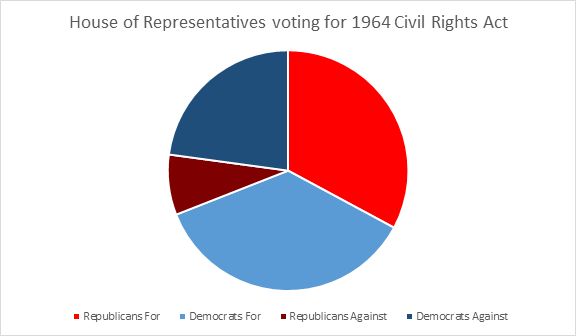American Political Parties Weren't Always Partisan

Voter's today are often under the mistaken assumption that the current American two-party political system operates the same as it always has. The truth is, this two-party system was fundamentally altered after the 60s, and looks nothing like its former self. Excessive partisanship has even convinced us that one party has a monopoly on "conservatism" and the other "liberalism."
The two-party system has always been a unique American construct. America's two-party system was designed with the intention that its members would function as non-ideological parties, willing to compromise and do what is best for the nation. Prior to the 1980s, both major American political parties were ideologically diverse.
There were large numbers of liberal and moderate Republicans. Likewise, there were additionally large numbers of conservative Democrats. This ideological divergence can be illustrated in major legislation from the 20th century. But is most typically shown by a roll call of the Civil Rights Act of 1964.
Critics of the two-party system usually complain about the limited options at the ballot box. They sometimes critique primaries, lack of parties, money in politics, and the media. However, in making these arguments, they forget that most countries that engage in parliamentary politics must form coalitions to conduct business.
Coalitions
Coalitions are when multiple parties form alliances to pass legislation. Coalitions are usually necessary in nations designed with a parliamentary system. This effectively turns the multi-party system into a two-party system. Consider the United Kingdom....
Frustrated voters have a tendency to blame the two-party system as the sole source of our nation’s problems. In my opinion, the system has historically been extremely successful.
The Democratic and Republican parties are not the problem -- partisanship is the problem. We can make the major parties less partisan and we can do it through primaries. Instead of disregarding primaries as a method of choosing candidates, we should work to make our major party primaries more inclusive by including people that do not conform to the brands envisioned by Washington elites. In this way, our major parties will become less partisan and more reflective of the values of independent-minded voters.
There is no historical reason why a person cannot be a "Liberal Republican" or a "Conservative Democrat." Ideological partisanship has convinced us of that one party has a monopoly on their perspective ideals.
Primaries are where our major parties define what it means to be Democrat and Republican. If independent-thinking voters joined in the process they would have influence to tell both major parties that moderation and compromise should be party values. Independents should seriously consider joining major parties and re-establishing our historical two-party system as it was intended to operate.
"The way you solve things, is by making it politically profitable for the wrong people to do the right things." - Milton Friedman
Additional Thoughts....
* Consider what a liberal, moderate, or conservative faction would look like inside our modern political parties.
* Research the following presidential elections as case studies where factions bolted from their party. (1912, 1964, 1968 and 1992)
* Consider joining a political party as a precinct committeemen.
* Identify what your primary issues and concerns are and research methods for issue advancement.
* Research terms (Blue Dog Democrat, Rockefeller Republican).
* Consider that movements always enjoy bipartisan support before meaningful action is made.
* Consider joining a major party if residing in a "safe state."
* Read up on the decline of Moderates within the Republican Party (Rule and Ruin).
"When parties become partisan you don't leave them, you retake them, and the primary vehicle for achieving this is traditional party primaries."






